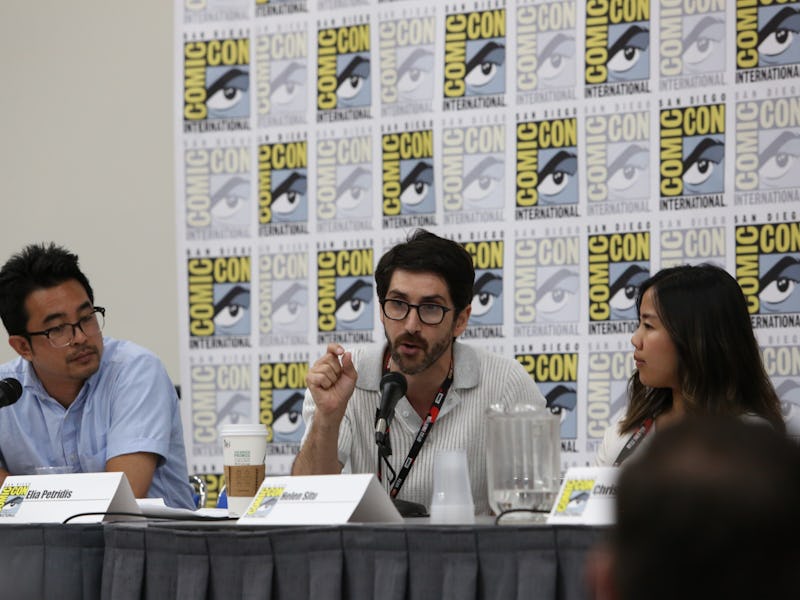JOB HACKS | The Secret to VR Is Faking it First
Elia Petridis, founder and CEO of Filmatics Creative Services, talks VR filmmaking and his new Halloween project.

Careers rarely go according to plan. In Job Hacks, we shake down experts for the insights they cultivated on their way to the top of their field.
This week, we spoke with Elia Petridis, founder and CEO of Filmatics Creative Services. Petridis began his career writing and directing indie films like The Man who Shook the Hand of Vicente Fernandez collaborated with Dubai nightclubs Act on the VR video Welcome to the Tea Party. His most recent project is Eye for an Eye: A Séance in Virtual Reality, a VR narrative collaboration with WeVr. Petridis spoke to Inverse about the future of VR, the changing film industry, and more.
What’s the most exciting thing about the VR medium to you?
Its potential to do something that film, TV, and music cannot do yet. I’m very curious to see where VR is going to take us beyond those platforms and what it can contribute. It’s obviously going to take in tow everything that those platforms contribute to it, whether it’s visual grammar or tricks of the trade in genre or narrative structure. That’s really exciting as an artist to explore what the new contribution to that conversation that it brings.
Did you ever think VR would become a major part of your career when you were in film school?
Back when I was in film school, YouTube was a spark in someone’s eye. Things have changed so much and so fast. I don’t think many people have the luxury of seeing a brand new medium born within their lifetime. I think people who are least surprised by VR are those who are avid sci-fi enthusiasts and have been following the wish fulfillment that scientists see VR coming to life. I didn’t really dip into those circles, so when it came to me, I said, “Wow, so what can this do?” I had no preconceived notions or bad habits or expectations of VR, so the deeper I got into it, the more enthused I got about it.
What’s the most challenging part of working with VR?
For me personally as an artist and as the CEO of Filmatics, there’s a lot of tech in VR, and your first instinct is to get ahead of it all so that you can master it and implement it at your will. But I find that it’s a harder process to be aggressive about maintaining your beginner’s mind, because the deeper you go into those woods, the more you are told what the tech cannot do yet. And you can read there’s a lot of noise that gathers there, where my job really is to say, “I want to do this, this is where we’re going. Now let’s go and figure that out.” As opposed to doing it the other way around. So I try to keep a good distance between me and information that might clutter that process. Beginner’s mind is really important, with anything VR or otherwise. It’s important to maintain your fresh, fresh outtake so that it stays really sincere, so that the art stays really sincere.
How do you approach that?
Honestly, I put on a blank pair of Google Cardboards without any phone in it whatsoever and I pretend to walk through the piece. I fake it first. That’s sort of an odd thing to do, but I do that.
What would a dream project be in the future?
I’m dying to try a really good music video and I’m dying to try marrying some sort of tangible requirement with a creative output in VR rather than just making distraction content, I’m dying to really get the hang of crafting and manufacturing content in VR that really services the need of a user case-by-case, particular-to-particular of what the ask is. I’d like to really figure that out. We have many projects on the horizon that we’re excited about; we’re really excited about “Eye for an Eye” coming out on Halloween.
Do you see VR as being the future of filmmaking?
I think there’s no such thing as the future of filmmaking. I think all these platforms serve different needs. My need to get out of my head, get out of the house, and sit in the dark or cuddle with a girlfriend, or pick up my friend after a breakup and take her to see a really shitty rom-com…those rituals are never going to change. That’s something movies do for us. Or snuggling up with my iPad and binge-watching Stranger Things. It’s not a competition, it’s just something that’s thrown its hat into the race, but there’s no desire for VR to cannibalize other forms of media. It’s just something new that we have at our disposal now.
This interview has been edited for brevity and clarity.